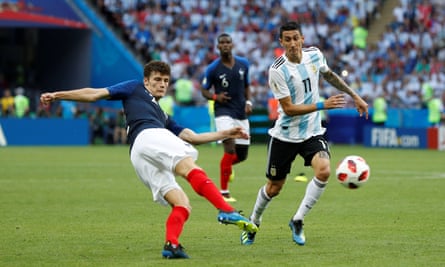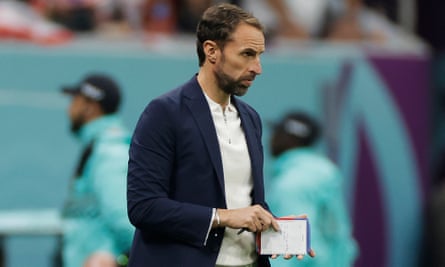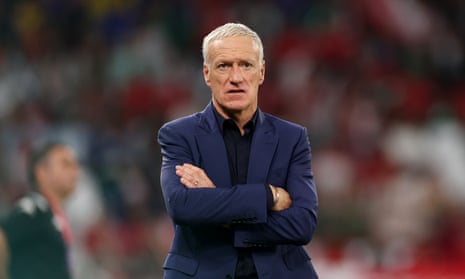“It felt like an Atlético Madrid match. It made me feel at home,” said Antoine Griezmann after France’s semi-final triumph over Belgium at the 2018 World Cup. That 1-0 win against perhaps the most potent attacking team at the tournament – who were fresh from their thrilling quarter-final win over Brazil – summed up France under Didier Deschamps. The team that would go on to become world champions resembled an international version of Diego Simeone’s famously combative Atlético team: conservative and rigid but also boasting supreme quality in forward areas. It is a blueprint that Gareth Southgate has used to achieve England’s recent success.
Deschamps’ conservative team was designed to fit modern international football, knowing the attacking fluidity achieved by club managers is difficult to replicate in a national team given the minimal time coaches have to work with their players. Many recent successes in international football have been built on a considered style of play: stoic and well organised in defence, with moments of individual quality in attack. Portugal’s triumph at Euro 2016 and France’s win in 2018 are standout examples.
In Russia, France’s starting full-backs Benjamin Pavard and Lucas Hernandez, effectively centre-backs by trade, offered a rigid base that was difficult to penetrate, directly contrasting the now standard flying modern full-back. Greizmann was even seen waving his Atlético teammate Hernandez back into a more defensive position during the quarter-final win over Uruguay. Although Pavard’s memorable long-range strike against Argentina in the last-16 game was a notable exception, neither full-back offered much in an attacking sense by modern standards.

Building from that solid base, Deschamps relied upon the considerable individual quality at his disposal in midfield and attack to create moments that helped his team over the line, Kylian Mbappé’s pitch-long gallop against Argentina being the tournament’s standout memory from a French perspective. Although the balance was adjusted when needed – such as in the 4-3 win over Argentina or in the open final against Croatia – that France team generally ground out their important wins.
Southgate has adopted those ideas to make his similarly built England team far more difficult to beat, and far more successful, than previous iterations. England have not conceded a goal since their opening game in Qatar, a 6-2 win over Iran, and they reached the final of the Euros last summer without conceding a goal from open play.
The possible introduction of a third centre-back against France on Saturday, mirroring Southgate’s strategy against Germany in the second round last summer, would be pushing Deschamps’ ideas to the extreme. Morocco coach Walid Regragui has followed a similar path to success in Qatar, showing a similar understanding of international football. He has picked a solid but technical back seven, while relying on Hakim Ziyech’s individual quality in forward areas where possible.
Roberto Martínez’s more attacking Belgium team represents the opposite school of thought. His failure to win a trophy despite the talent available to him in recent years represents a triumph of one philosophy over the other at the international level, with France’s win over Belgium in the semi-finals four years ago being the most overt manifestation of that struggle. Unlike Belgium under Martínez, France and England take few risks and use their superior quality to wear down weaker teams. It’s a sensible decision for major nations at tournament level. They maximise their dominance while knowing their rivals do not have the time to engineer a more creative system to outplay stronger opponents.
France, however, approach the meeting with England far less assured than they did the Belgium game four years ago, having become a little more expansive since Russia. Injuries have robbed Deschamps of his first-choice midfield of Paul Pogba and N’Golo Kanté, as well as Samuel Umtiti, who would be partnering Raphaël Varane at centre-back if he were fit. He has also chopped and changed his tactics. After playing three centre-backs for the 18 months before the World Cup, Deschamps switched to a four-man defence at the last minute and then returned to a version of the setup that proved successful in 2018, despite having no time to drill the system pre-tournament.
The now-retired Blaise Matuidi is perhaps the biggest loss from 2018. France lack a natural replacement in the dynamic left-midfield role that he played in their asymmetrical 4-2-3-1. Like Southgate, Deschamps has been more positive in the group stage, using a more traditional 4-2-3-1 with Ousmane Dembélé playing as a more orthodox wide man on the right. Unlike Southgate, however, Deschamps is unlikely to retreat when faced with tougher opponents.

That, however, may not be wise. The left-back Hernandez was injured in France’s opening game against Australia, while Pavard has been dropped. Pavard’s replacement, Jules Koundé, also naturally a centre-back, has also endured mixed form at full-back for France. Deschamps has few options, having oddly only picked one natural full-back, left-back Theo Hernández, in his 26-man squad. Dayot Upamecano seems to be Deschamps’ favoured partner for Varane but the Bayern Munich defender lacks international experience and, while technically excellent, he does not match Umtiti for ruthlessness.
France could also be vulnerable at the base of their midfield. Aurélien Tchouaméni is undoubtedly talented but he lacks international tournament knowhow and carries considerable responsibility alongside Adrien Rabiot. Having made up with Deschamps after refusing to be on the stand-by list in 2018, Rabiot has performed well in Qatar but, after struggling with middling club form for some time, the Juventus midfielder could be seen as a weak link by England. He has had more freedom than expected in Qatar, often leaving Tchouaméni to cover large areas singlehandedly, which could suit England’s counterattacks.
Uncertainty reigns for both teams. Like England, the true level of this new-look France remains something of a mystery, neither side having faced a major test so far. France’s win over a much-fancied Denmark team in the group stage proves little given the Danes’ catastrophic tournament overall and, although Southgate’s team were troubled by the USA at times, France will present a very different challenge.
France’s landmark win over Belgium in 2018 “felt like an Atlético Madrid match” to Griezmann; this meeting between the tournament’s two leading pragmatists might feel like a match between two Atlético Madrid sides. Both teams will see themselves in their opponents. The team that feels most at home in this chess-like encounter – a hastily reorganised France team or a potentially even more conservative England – is likely to reach the last four.

Comments (…)
Sign in or create your Guardian account to join the discussion